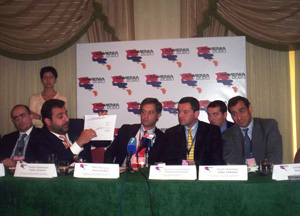“Armenia-2020” organized a conference at Armenia Mariott Hotel on
September 20, where the project organizers presented strategies for
sustaining the economical transformation. According to the organizers,
these strategies will provide productivity and competitive growth of
our economy.
It is worth to mention, that ”Armenia-2020” project, which was
founded in 2001, is a union of individuals, whose main goal is to shape
the future of Armenia. First of all, the reporters spoke about the
two-number development marks. The surveys pointed out, that 1% GDP
development in developed countries is equal to a minimum 20-25% GDP
development in Armenia. Besides that, even in case of providing this
desirable mark it will take more than ten years to become a developed
country. So we shouldn’t be satisfied with our achievements and we must
move forward.
Dr Peter Kralich, who is from Slovenia and is a member of McKinsey
Global Institute Advisory Council, spoke about globalization,
transformation and competitiveness in his speech. According to Kraljic,
globalization faces the countries going through the transformation
period, with new possibilities and new risks, and Armenia is in the
list of those countries. ”If we don’t understand what we should do,
we, the small countries, will not be a subject of globalization, but an
object, and big countries will make decisions instead of us. This is
why we need a specialized leaders institution”,- says Kralich. Kralich
appreciated the fact, that the ”Armenia-2020” project examined the
economic fields, because this is the place, where competition is
”born”, and this competition is one of the main factors for economic
development. Armenia is a small country, and it cannot resist the
competition in the world market with its capacities, so the Armenian
companies must concentrate on innovations. Klarjich invented a new
term: “national companies”, which can be competible abroad (for
instance Nokia for Finland), and said, that one of the most important
factors for economic development is to keep those companies and
businesses. According to Klarjich, to make investments doesn’t mean to
buy and later resell a company, and as for the national companies, they
must not be given ”to others”, like Croatia and Hungary did. The same
may happen to Armenia if it doesn’t follow up.
Pierre L.Gurdjian, a member of the “Armenia-2020” board, is very
optimistic. In his opinion, if we want to have a developed Armenia, we
will. He thinks, that microeconomy is on the base of our economic
development, i.e. companies and their effective management, for which
we must found a specialists’ institution: after all, Armenia is
competitable with its human resources. Economic development is possible
by developing export fields. These, according to the analysers of the
project, can be Information Technologies, tourism, health care. But Mr
Gurdjian is sure, that in parallel with this the traditional fields of
economy must develop (agriculture, textile production, etc.), which
will “serve” the competing companies.
Noubar Afeyan, a member of “Armenia-2020” project board, spoke about
the necessity to found a Competition fund in his speech. This is an
idea, an approach, which will be realized when the long-term strategy
for economic development is ready. The organizers of “Armenia-2020”
program expect to meet the support of Armenian government: both
financial and bureaucratic. But only the financial support of the
government is not enough. According to Mr Afeyan, other financial
donors should be involved too.
Investments will play a big role in our market as a source for
financing, only if stock companies trust each other. The project has a
goal to help Armenian businessmen understand, that they should sell
stocks and assure investors to become share holders in Armenian
companies.
In our opinion, the analyses and visions of “Armenia-2020” project are
real, and the government of Armenia must take the appropriate actions
to support this project.

